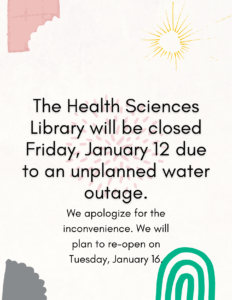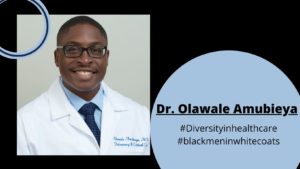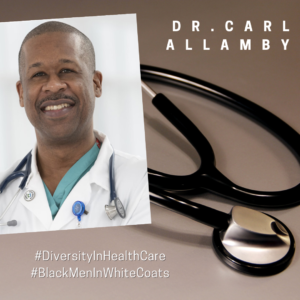
The Health Sciences Library will be closed Saturday, March 30 due to an unplanned water outage. We apologize for the inconvenience. We plan to re-open on Monday, April 1.

The Health Sciences Library will be closed Friday, January 12 due to an unplanned water outage. We apologize for the inconvenience. We will plan to re-open on Tuesday, January 16.
The Health Sciences Library will host a presentation today at 5pm by Chanique Ecby, DNP, APRN, FNP-C, Clinical Assistant Professor, Gessner College of Nursing, on nursing care for domestic violence. The program is related to the National Library of Medicine (NLM) traveling exhibition, Confronting Violence: Improving Women’s Lives/Enfrentando La Violencia: mejorando la vida de las mujeres, on display at Health Sciences Library through December 4.
Abstract
Domestic violence continues to be a global issue. More than 61 million women and men have experienced some type of psychological aggression by a partner in their lifetime (CDC, 2022). Nurses play a vital role in assessing risk factors and providing care for individuals who may be in an unhealthy situation. Therefore, it is critical that nurses uphold the American Nurses Association code of ethics when these situations arise. During this presentation, we will explore the journey of a young woman as she navigates through these life changes and the impact a nurse had on the outcome.
Dr. Ecby graduated from University of Houston with a bachelor’s degree in Human Development and Family Studies. She earned her Bachelor of Science in Nursing, Master of Science in Family Nurse Practitioner, and Doctor of Nursing Practice degrees from Prairie View A&M University and joined the Andy & Barbara Gessner College of Nursing as a Clinical Assistant Professor in 2022. Dr. Ecby holds clinical expertise in obstetrics, women’s and reproductive health, and sexually transmitted infections. Her research interests include women’s health promotion and reproductive health.
Rachel Helbing, EdD, AHIP, Head of Health Sciences Libraries, UH Libraries will give concluding remarks on NLM resources.
The Health Sciences Library is located inside the Health 2 Building, and the presentation will be in room 2217.

The Health Sciences Libraries are providing a fall webinar series on searching the health literature. We hope you can join us on Teams for these sessions. They will also be recorded. You can visit the links below at the start of each session to join.
Thursday, September 7, 2023, 12 –1 pm
Searching the Health Literature 101: Recording
This session will provide an introduction to searching the health literature with tips, tricks, and best practices to make your searches more successful.
Rachel Helbing, Head of Health Sciences Libraries, will cover searching basics like choosing appropriate databases, using PICO to generate a list of keywords, constructing a strategy with Boolean operators, and more. Skills learned in this session will be applicable for searching a variety of biomedical and social sciences databases.
Thursday, October 5, 2023, 12 – 1 pm
PubMed 101: Recording
This session will provide an introduction to searching PubMed, the world’s premiere biomedical database which comprises more than 36 million citations.
Rachel Helbing, Head of Health Sciences Libraries, will cover PubMed basics like constructing a search, using MeSH and search filters, sorting and sharing results, and accessing full text. Skills learned in this session will help you get the most out of your PubMed searches.
Thursday, November 9, 2023, 12 – 1pm
Embase 101: Recording
This session will provide an introduction to searching Embase, a major biomedical and pharmaceutical database indexing over 8,200 journals, including 3,000 journals unique to Embase and journals from 95 countries.
Rachel Helbing, Head of Health Sciences Libraries, will cover Embase basics like constructing a search, using Emtree and search filters, sorting and sharing results, and accessing full text. Skills learned in this session will help you get the most out of your Embase searches.
Description: StatPearls provides exam review and self-testing resources. An individual StatPearls account is required.
Instructors need to contact your school’s library liaison to set up an account for student quizzes (slapka@central.uh.edu for medicine, rrhelbin@central.uh.edu for nursing and pharmacy).
Subscribed packages:
- Family Medicine (Board Review)
- Nursing School
- Pharmacy
- USMLE Steps 1, 2, and 3
- EMS-EMT Basic
- Physician Assistant
- Radiology Technology
Access: You must register first through the UH Libraries registration portal using this link: UH Libraries Registration Portal.
Once you are registered, you can log in at the StatPearls website.
Information: Available on campus.
Available off campus with prior registration.
Access is provided through a UH Libraries subscription via a consortial agreement with other Texas libraries.
The library’s access to BoardVitals will be ending Thursday, August 31st. The group through which we receive BoardVitals is switching to a different board review service, StatPearls, https://www.statpearls.com/. We will have access to select packages on StatPearls starting September 1st.
Packages to be included are:
- Nursing School Package
- Pharmacy Package
- Family Medicine
- USMLE Step 1, Step 2, Step 3
- Physician Assistant Package
- EMS-EMT Basic
- Radiology Technology
More information about StatPearls is forthcoming. We apologize for any inconvenience this might cause. If you have any questions, please contact collections@uh.edu
An important change in access to EBSCO journal and database content has been activated, affecting direct links in syllabi, handouts, bookmarks, and other course materials.
Your saved links expire August 31, 2023. To ensure continued access, UH faculty are encouraged to immediately update any direct links in your materials (instructions below). This includes the affected databases, and any links or “permalinks” you may have used to access full text articles or journals that are provided through these EBSCO databases.
We regret the timing of this update, however EBSCO recently informed us that, due to a licensing change that goes into effect September 1, 2023, all of our links must be updated. Links are already updated on Libraries systems, including the website, subject and class guides, and course reserves. UH Libraries remains committed to ensuring continued access to this critical content and is working quickly to ensure seamless access through our systems for the beginning of the semester.
Update your saved links using the following steps below:
Update direct links to individual databases
Step 1: Access the Libraries’ A-Z databases list
Step 2: Find the database you intend to use and access from there
Update links for journals
Step 1: Access the Libraries’ Journal Title search
Step 2: Search for the journal title of interest
Step 3: Click on the Permalink button on the journal record, and copy the link
Update links for articles
Step 1: Access the article via the search box on the Libraries’ homepage
Step 2: Search for the article title of interest and select it
Step 3: Click on the Permalink button on the article record, and copy the link
Journals and articles may be available from multiple vendor platforms or providers. For example, a specific journal may be provided by EBSCO, ProQuest, etc.; you may have multiple options to link to when performing these searches.
While rare, certain kinds of hyperlinks (such as saved filtered searches) may need to be manually recreated to ensure correct link resolution, and these suggestions do not cover all hyperlinks that may be impacted. If you have any questions, please contact collections@uh.edu.
To avoid having to update links in the future, we recommend that you access databases via the Libraries’ A-Z databases list and include your article readings via course reserves.
We appreciate your understanding at this busy time in the year and we wish you a great start of the new semester.
The Health Sciences Library will be closed December 21 due to a water outage.
We will be working remotely from 8am until 5pm. If you need assistance please send an email to rrhelbin@central.uh.edu.
We will resume our intersession hours December 22.
Continuing with our 2022 theme of Black Men in White Coats, we are featuring Dr. Olawale Amubieya for the month of July.

We’ve all been asked the question “What do you want to be when you grow up?” but how many of us can really say that we’ve cultivated those budding aspirations and nurtured them into a thriving career? Dr. Olawale Amubieya is one of the few that was able to do just that; take a dream and through hard work and perseverance, make it a reality.
It all started when his childhood church decided to host a career pageant. This is where he was asked for the first time what he wanted to be, and that one seemingly inconsequential question would end up being the catalyst that propelled him down the path of medicine. From that moment on, Dr. Olawale Amubieya took on the nickname “Doctor” among the neighborhood, and as the years faithfully ticked by, suddenly his goal seemed more tangible.
Dr. Olawale Amubieya had never seen a doctor who resembled himself before. He was a second generation immigrant from Nigeria, trying to earn the education his parents had strived so hard to give him, but he didn’t let the lack of representation deter him. With the support and confidence of his community, he began working laboriously towards his goals. Before he knew it, his persistence had started to pay off, and he was able to attend Yale as an undergraduate. From there the momentum just kept building. He would go on to attend Columbia College of Physicians and Surgeons, and ultimately pursued his residency at UCLA for internal medicine. He is currently completing his fellowship at UCLA, where he has been able to work with a diverse group of patients.
Today, Dr. Olawale Ambuieya sees himself as both a super hero of sorts and a role model to other people of color aspiring to work in the field of medicine. He wears his white coat as if it were a red cape, and strives to find answers and advocate for his patients. All the while bearing the weight of representation, knowing that he is one of the few African Americans in his field. This has served to motivate him to keep climbing the ladder of success; to provide an example for future black doctors to look up to and know that it is possible.
Continuing with our 2022 theme of Black Men in White Coats, we are featuring Dr. Carl Allamby for the month of June.
Carl Allamby had a childhood passion of becoming a doctor, but getting to that point wasn’t easy. He grew up in East Cleveland where money was scarce for his family, so he never put much effort into school. However, he had a really good work ethic and found he was good at fixing cars.
 For over 20 years that’s what he did, but he wanted to grow the business he was now in. That was when he enrolled in college to get his business degree. While at Ursuline College he ran into something unexpected: a biology course. He resisted taking the class at first but after realizing he needed it to graduate he enrolled. That first class was all he needed to remember his childhood dream.
For over 20 years that’s what he did, but he wanted to grow the business he was now in. That was when he enrolled in college to get his business degree. While at Ursuline College he ran into something unexpected: a biology course. He resisted taking the class at first but after realizing he needed it to graduate he enrolled. That first class was all he needed to remember his childhood dream.
He received his business degree, then took science courses at a community college. After that he enrolled in a program at Cleveland State University which prepared him for the MCAT. After graduating with his second undergraduate degree he moved on to Northeast Ohio Medical University where he received his medical degree in 2019 at age 47.
Dr. Allamby is currently an Emergency Medicine Resident and Physician at Cleveland Clinic Akron General. He is also a motivational speaker, hoping to encourage the next wave of black doctors when they are young. He knows that if they see somebody who looks like them, they could also pursue their dreams.
Info sources: https://www.cleveland.com/tipoff/2019/07/car-mechanic-shifts-gears-becomes-a-doctor-at-age-47-and-helps-address-shortage-of-black-doctors.html; https://www.astro.org/Meetings-and-Education/Micro-Sites/2020/Annual-Meeting/Learn/Meeting-Highlights/Storytelling/ASTRO-Voices/Carl-Allamby